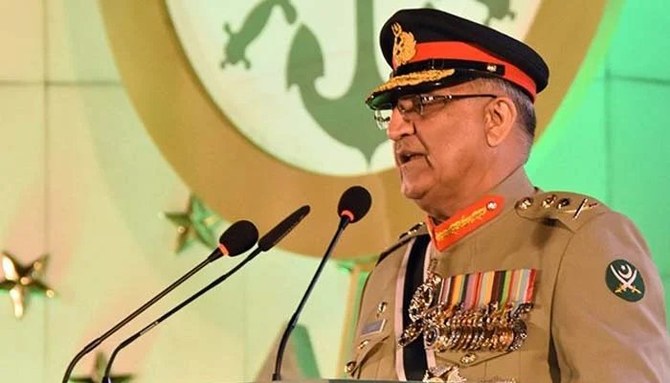ISLAMABAD: Pakistan’s army chief has said that Islamabad was seeking an inclusive government in Afghanistan which respected human and women’s rights, as the Taliban try to set up a new regime after their lightning takeover of Kabul last month.
General Qamar Javed Bajwa also urged the United Nations and world powers to play a “positive role” for lasting peace in Afghanistan and its new rulers to resolve all issues amicably and lead the Afghan people to peace and prosperity.
The Taliban swept to the Afghan capital on August 15 after making rapid territorial gains across Afghanistan as US-led foreign forces withdrew from the country.
Since then, talks have been underway to form a new government, with Taliban spokesperson Zabihullah Mujahid saying on Monday that the group would make the announcement “in the next few days.”
“We also expect a stable and inclusive government in Afghanistan that [ensure] human rights, including women’s rights,” Bajwa told a gathering at the army’s General Headquarters in the garrison city of Rawalpindi, on the occasion of Defense Day, on Monday.
Islamabad has for long been persuading the Taliban to include representatives from its Pashtun, Hazara, Tajik, Uzbek and other ethnic groups in its new regime.
Ethnic diversity has been at the center of politics and conflicts in Afghanistan, with no single group enjoying a decisive majority in the country of 38 million people.
Bajwa said that Pakistan expects major powers of the region and the world to play a positive role in forming the new Afghan government and that Islamabad was “willing to cooperate” for this.
“While the situation [in Afghanistan] provides an opportunity for peace and stability, it could also be a prelude to more threats and difficulties,” Bajwa warned.
He added that Pakistan’s armed forces were keeping a close watch on developments in Afghanistan after the chaotic withdrawal of foreign troops in the past few weeks.
Earlier on Monday, in a meeting with Italy’s Foreign Minister Luigi Di Maio in Islamabad, Prime Minister Imran Khan said that Pakistan had “suffered enormously” due to the protracted conflict and instability in Afghanistan.
“At this critical juncture, it was vital to stabilize the security situation in Afghanistan, take steps to consolidate peace, and preclude any mass exodus of refugees,” he said.
There are officially 1.4 million Afghan refugees living in Pakistan, with the number of unregistered refugees expected to be much higher.
“In this context, preventing a humanitarian crisis and stabilizing the economy were the most urgent priorities,” PM Khan said.
















